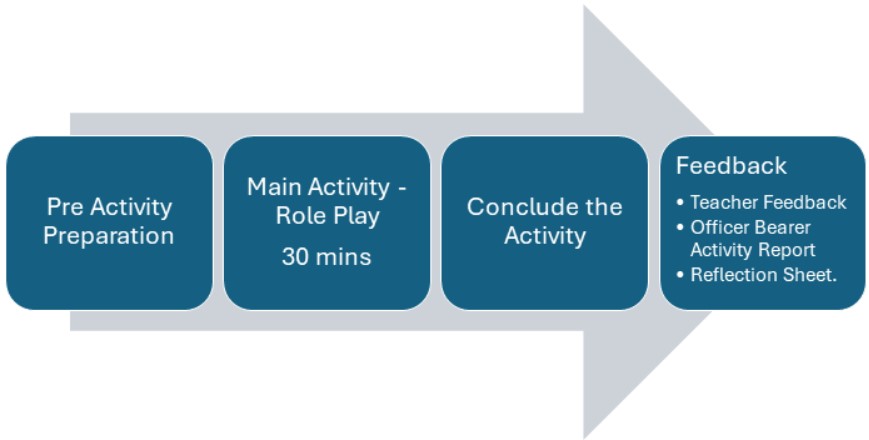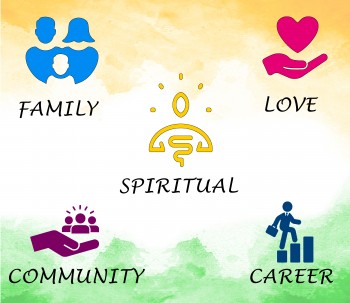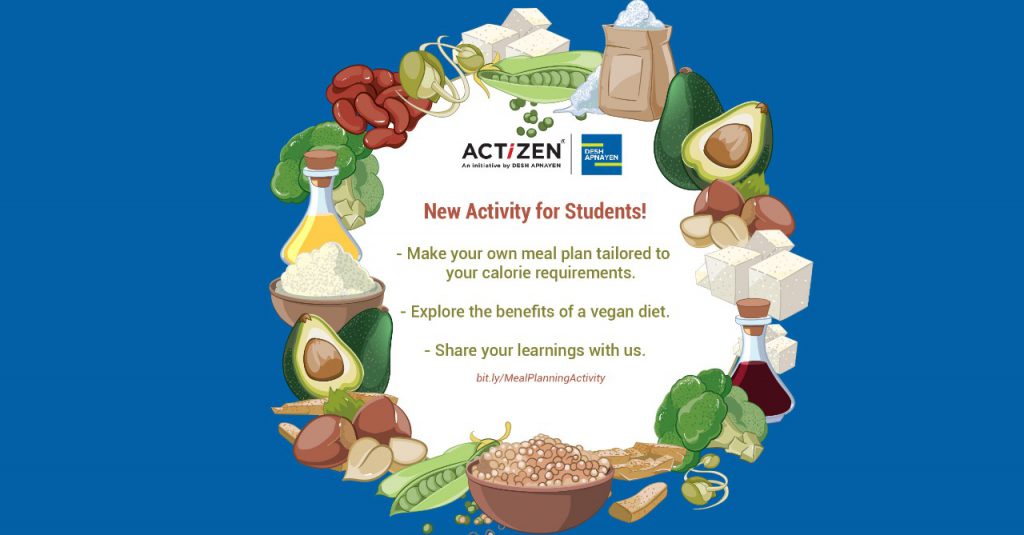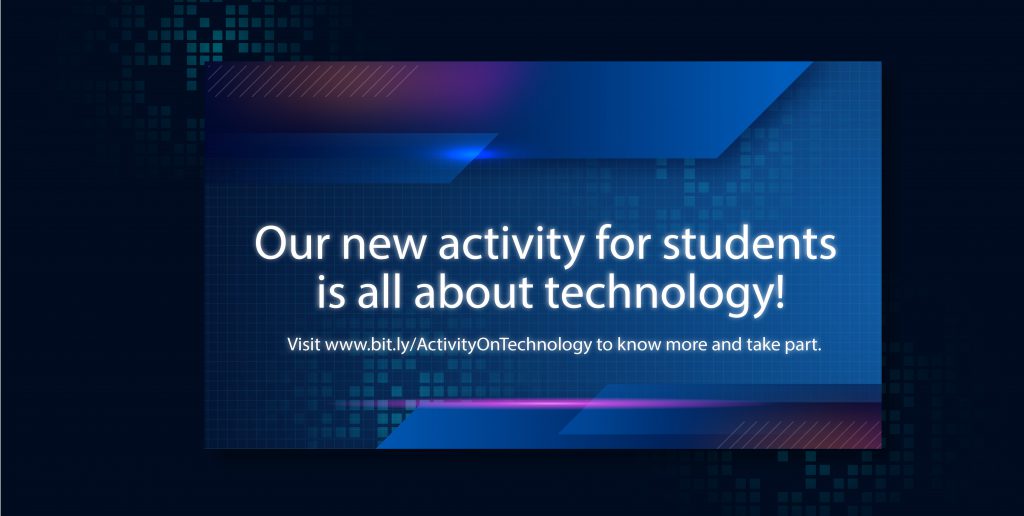September Activity – EMPATHY WALK
OBJECTIVES
- To experience about inequalities existing in our society through Empathy Walk.
- To develop empathy for others especially those people who are either not aware of the rights or don’t get opportunity like others have
SKILLS
Communication, Critical Thinking
VALUES
Empathy
MATERIAL REQUIRED
Blank sheet/rough paper to make role name card, pens.
PRE-ACTIVITY PREPARATION
1. Teacher will decide the number of groups for activity as per the class size. Divide the class into atleast 6 groups. One group will represent one role.
(Note - For larger class size, more groups can be made as extra roles are provided.)
2. Tell Office Bearers to write roles on paper of 10cmX10cm to make role tags. Make one role tag for each group. Role tags list refer to Annexure 1. Keep the role tags ready one day before the activity day and bring them on activity day.
3. Teacher will decide the venue for the activity beforehand as per the group size. You can conduct the activity in class, either by moving benches, or in front space. Or you can play this game in hall/ground as per space available.
MAIN ACTIVITY
Estimated Time: 30 minutes.
- Divide class into groups as decided. Ask groups to select one representative. Call them to pick the chit to decide the role of group.
- Tell students they have 5 mins to think about the role in group i.e. what it would be like to be that person – discuss in group how this person will feel, behave, etc. For example – if you got role of homeless person, think how this person will not be having a place to stay.
- Teacher will ask student representative from each group to stand in a line, side by side, and face the teacher. Tell the representing student to wear the name tag/carry the role tag in hand.
- Tell students, some statements will be read. If your character – role your group got would answer yes to the statement, then take a step forward. If you think they would answer no, then stay where you are.
- Group members can help the representative of the group to help decide to move forward or not. Tell the students after the statement is read, they will have 30 seconds to decide. Clap will be the signal for students to move forward or stay in their position.
- Read out the statements (atleast 7-8) to the group as given in Annexure 2. (Adapt according to your group and context as needed.)
- After all statements have finished ask the group to put their character sheet on the floor and step away so that everyone can see the position of all the role cards.
Note: Continue doing the conclusion of activity at the same venue.
CONCLUDE THE ACTIVITY
NOTE - If time permits, teacher can give Office Bearer opportunity to do conclude this activity as mentioned below. Incase if time is short, invite the office bearer to ask the students – What did they learn from the activity?
Office Bearer (with support of teacher) will conduct the concluding activity. Ask the students in pairs to think about the What did they learn from Empathy Walk experience – Guide them to think about
We should conclude like -
- Which roles are left behind or still are in last row? And Why?
- Why we have such differences in getting opportunities even if we are equal?
- How are they feeling who are left behind?
- How students standing in front row are feeling? Let us think, if we reverse the order or first and last row, how they will feel now?
This is called Empathy, when we feel about the person who is left behind and do not have much opportunities due to money, power, education, health etc. Can we do something about it?
How should children in the society should empathise with such people to make our society better place to live in?
Teacher can support Office bearers & facilitate the sharing discussion and summarize the key learning points for the activity.
- Summarize 2-3 points from presentation that students will share.
- The activity helped us to understand that all of us don’t have same opportunities and benefits. That is why we see inequalities around us.
- Recognize the significance of understanding and respecting the feelings of others, especially those who are different from us, to develop empathy towards them. Empathy means—putting themselves in someone else's shoes to understand their feelings and experiences.
DESH APNAYEN WALL
For this activity, the following can be updated by office bearers on the wall.
- Office Bearer Concluding activity points. (pair work if any of them have written)
- Encourage students to write ways to promote empathy within their classroom.
- Quotes on Empathy
POINTS TO NOTE
- While deciding the number of roles & groups keep in mind the available space & group size.
- Prepare the chits of role before the session. You can assign the task to office bearers.
- If weather is favorable, and only if it’s possible, you can play this game on ground for easiness to move around and involvement of more students. Teacher has choice to venue as per available space and number of children.
- Groups members are not required to dress up/enact the role assigned to them.
- You can read out the statements in local language for ease of understanding if required. Avoid explanations of the statement.
ACTIVITY PHOTOS TO BE SHARED
For Activity photos, please share clear pictures of -
- Picture of Empathy Walk at atleast two different group positions. (2 photos)
- Office Bearer concluding the activity ( 2 photos)
- Desh Apnayen Wall (2 photos)
ANNEXURE
Annexure 1 – Role Cards
Roles:
- Student studying in Grade 7 in your school
- Police Inspector
- Doctor
- Sweeper
- Person with Disability.
- Orphan Child
Additional Roles:
- Middle-aged Mother – Home maker
- Vegetable Vendor
- Businessperson
- House help
- Teacher
- Bus driver
- Lawyer
- Shop keeper
- Taxi/Auto driver
Annexure 2 – Statements
Read atleast first 8 statements in this order, others can be taken as per the time available.
- I can complete/did complete the 12th grade.
- I never sleep hungry.
- I feel safe and secure in my community all the time.
- I have/had freedom from my parents to choose my college/school/job .
- I depend on others for my basic needs like food, shelter, movement, etc.
- I have spare time to watch movies and spend with my friends
- I get to see and talk to my parents/grandparents as and when I want.
- I am free to choose any religion I want to follow.
- I can express my opinions in front of others(in public).
- I have the freedom to choose the work/career of my choice.
- I can pay for good hospital treatment for my family.
- I can comfortably use public services.
- I have a say in decision making in my community/society.
- I feel harassed/bullied/teased by people around me.
- I get treated differently by people because of my appearance.





